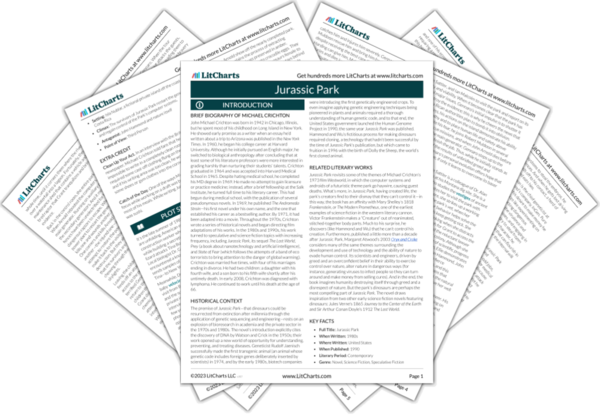The raptors symbolize the power of nature and its ability to evade and escape human control. Dr. Henry Wu can extract, sequence, and clone dinosaur DNA from biological matter preserved in amber. But he and his team can’t predict which dinosaur they’re making until it hatches, and they have no insight into the animal’s behavior or physiology prior to its hatching. The raptors, it turns out, are lethal, intelligent, and coordinated, making them the most dangerous animals the park produces. They evade biological control when they gain the ability to reproduce independently, and the fact that they are isolated and kept off display due to the danger they pose undermines Hammond’s assurances that all the animals—and the park—are perfectly safe and under control. Once they escape the confines of their enclosure, they pose the most direct and ongoing threat to the park’s visitors, attacking Robert Muldoon, Tim, Lex, Ellie Sattler, John Arnold, and Wu. In this way, they also graphically demonstrate the dangers of inappropriate and uncritical applications of technology for its own sake (or for the sake of greed)—as Dr. Ian Malcolm complains, Wu and the others were so focused on what they could do with genetic technology that they never bothered to ask whether they should do it. Thus, when Wu falls victim to his own creation, his death contributes to the book’s argument that technological and scientific discovery need to be guided by thoughtful regulation and oversight.
Raptors Quotes in Jurassic Park
“Let’s keep it in perspective,” Hammond said. “You get the engineering correct and the animals will fall into place. After all, they’re trainable.”
From the beginning, this had been one of the core beliefs of the planners. The animals, however exotic, would fundamentally behave like animals in zoos anywhere. They would learn the regularities of their care, and they would respond.

Unlock explanations and citation info for this and every other Jurassic Park quote.
Plus so much more...
Get LitCharts A+Muldoon worried even more about the velociraptors. They were instinctive hunters, and they never passed up prey. They killed even when they weren’t hungry. They killed for the pleasure of killing. They were swift: strong runners and astonishing jumpers. They had lethal claws on all four limbs; one swipe of a forearm would disembowel a man, spilling his guts out. And they had powerful tearing jaws that ripped flesh instead of biting it. They were far more intelligent than the other dinosaurs, and they seemed to be natural cage-breakers. […] Raptors were at least as intelligent as chimpanzees. And, like chimpanzees, they had agile hands that enabled them to open doors and manipulate objects. They could escape with ease. And when, as Muldoon had feared, one of them finally escaped, it killed two construction workers and maimed a third before it had been captured.
The behavior of the dinosaurs had always been a minor consideration for Wu. […] You couldn’t really predict behavior, and you couldn’t really control it, except for in very crude ways. […] You couldn’t look at a DNA sequence and predict behavior. It was impossible.
And that had made Wu’s DNA work purely empirical. It was a matter of tinkering, in the way a modern workman might repair an antique grandfather clock. You were dealing with something out of the past, something constructed of ancient materials and following ancient rules […] Wu would make an adjustment and then see if the animals behaved any better. And he only tried to correct gross behavior: uncontrolled butting of the electrical fences, or rubbing the skin raw on tree trunks. Those were the behaviors that sent him back to the drawing board.
The compys didn’t look dangerous. They were about as big as chickens, and they moved […] chickens. But he knew [that…their] bites had a slow-acting poison that they used to kill crippled animals.
Crippled animals, he thought, frowning.
The first of the compys perched on the hillside, staring at him. It stayed about five feet away, beyond his reach, and just watched him. Others came down soon after, and they stood in a row. Watching. They hopped up and down and chittered and waved their little clawed hands.
“Shoo! Get out!” he said, and threw a rock.
The compys backed away, but only a foot or two. They weren’t afraid. They seemed to know he couldn’t hurt them.
Angrily, Hammond tore a branch from a tree and swiped at them with it. The compys dodged, nipped at the leaves, squeaked happily. They seemed to think he was playing a game.












